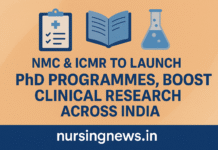New Delhi, October 8, 2024 – India has officially eliminated trachoma as a public health problem, as declared by the World Health Organization (WHO). This milestone was reached following decades of persistent efforts, making India the third country in the WHO South-East Asia Region to eliminate this disease, after Nepal and Myanmar. The announcement was made during the WHO South-East Asia Regional Committee meeting held in New Delhi, where the official certification was presented to Smt. Aradhana Patnaik, Additional Secretary and Mission Director of the National Health Mission.
Understanding Trachoma: A Former Leading Cause of Blindness
Trachoma is a bacterial infection of the eyes caused by Chlamydia trachomatis, and it is highly contagious. The disease spreads through contact with the eyes, nose, or throat secretions of infected individuals and, if left untreated, can lead to permanent blindness. Trachoma was once widespread in India, particularly in regions with poor sanitation and limited access to clean water, making it a significant public health challenge. At its height, trachoma was among the leading causes of blindness in the country, especially during the 1950s and 60s.
WHO classifies trachoma as a neglected tropical disease, one that disproportionately affects impoverished communities globally. It is estimated that approximately 150 million people worldwide are affected by the disease, with millions at risk of blindness if left untreated.
India’s Journey to Elimination
India’s fight against trachoma began in earnest in 1963 with the launch of the National Trachoma Control Program. Over the years, the program was integrated into the broader National Program for Control of Blindness (NPCB), which focused on reducing blindness caused by various factors, including trachoma.
In 2017, India was declared free from infective trachoma, the active form of the disease. However, WHO’s criteria for trachoma elimination required further surveillance and evidence that the disease no longer posed a public health threat. To meet these criteria, the National Health Mission and the Ministry of Health and Family Welfare conducted extensive surveys, including the National Trachomatous Trichiasis (TT only) Survey, between 2021 and 2024. This survey covered 200 previously endemic districts across the country, gathering critical data to support the elimination claim.
The results of the survey were compiled into a detailed dossier and submitted to WHO for review. After a thorough assessment, WHO officially certified India as having eliminated trachoma as a public health problem.
SAFE Strategy: A Comprehensive Approach
India’s success in eliminating trachoma was largely due to the implementation of WHO’s SAFE strategy, which stands for Surgery, Antibiotics, Facial cleanliness, and Environmental improvement. This approach targeted the root causes of the disease, focusing on improving sanitation, ensuring access to antibiotics to treat infections, and raising awareness about facial cleanliness to prevent the spread of the disease.
The combination of medical intervention and public health initiatives, alongside community-level engagement, has been key to India’s victory over trachoma. The country’s sustained commitment to improving healthcare infrastructure and access in remote areas played a vital role in ensuring that trachoma cases were effectively managed and treated.
A Global Health Achievement
India’s elimination of trachoma is a significant milestone in the global fight against neglected tropical diseases. While the battle is won in India, WHO estimates that millions of people worldwide continue to be affected by trachoma, particularly in underprivileged and rural communities. India’s success offers hope and serves as a model for other countries striving to eliminate this debilitating disease.
Continued Vigilance
Even with this achievement, Indian health authorities remain vigilant. Ongoing surveillance efforts will continue to ensure that trachoma does not re-emerge, and India remains committed to sustaining the progress made in combating neglected diseases.
This victory highlights the importance of long-term commitment, comprehensive public health strategies, and international collaboration in addressing complex health challenges. As India celebrates the elimination of trachoma, it underscores the nation’s growing leadership in global health and its determination to eradicate preventable diseases affecting its most vulnerable populations.










